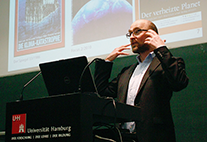Inaugural lecture: How climate change is affecting journalism
23 October 2015, by CEN Universität Hamburg

Photo:
Reporting on climate change poses challenges for journalists. In his inaugural lecture last week, Michael Brüggemann explained just what those challenges are.
Reporting on climate change poses challenges for journalists. In his inaugural lecture last week, Michael Brüggemann explained just what those challenges are. The talk was his first official act as the latest addition to Universität Hamburg’s Faculty of Business, Economics and Social Sciences. The communication researcher heads the CliSAP research group “Media Constructions of Climate Change.”
From the outset, CliSAP Speaker Anita Engels emphasized that Brüggemann’s position is a unique one: “His specialization is the only one of its kind in Germany, and reinforces Hamburg’s role as the capital of climate research in Germany.” After all, his official title is “Professor of Communication Research, Climate and Science Communication.” Gabriele Löschper, Dean of the Faculty of Business, Economics and Social Sciences, also stressed the significance of his appointment for the standing of her faculty. Brüggemann’s close cooperation with the Cluster of Excellence CliSAP and the Centre for Globalisation and Governance as part of the CEN will help to further strengthen collaboration between the natural and social sciences.
Academic and journalistic expertise
Brüggemann, who completed his postdoctoral research in Zurich, got to know Hamburg during his doctoral studies, which he completed with the distinction summa cum laude. His academic qualifications are complemented by a practical one: he studied at the renowned German School of Journalism in Munich and gathered several years of journalistic experience. Following his extended sojourn in Switzerland, the researcher, who turned 39 on the day of his aforementioned lecture, has now returned to northern Germany.
During his talk, he shared glimpses of his findings on the subject of climate communication and journalism, which he illustrated with current examples. One of them was a Tagesschau report on the 10th German Climate Conference (Deutsche Klimatagung) in September. In the segment, strictly scientific statements were embedded in a political context, i.e., they were politicized after the fact – which, according to Brüggemann, is one of the standard routines used in journalism. But it poses problems for climate researchers, whose goal is often to refrain from interpreting their findings politically.
The tradition of balanced reporting – the bane of climate journalism?
Another convention in the world of journalism that poses problems when reporting on climate change is the principle of balanced reporting: for every controversial issue, both the pro and contra arguments should be presented. Yet, in the case of climate change that often means that respected climate researchers and “skeptics” are often presented as equals. In this regard, Brüggemann showed an interesting way of addressing the problem: he showed an excerpt from a US talk show hosted by John Oliver, who is well known for bringing together extensive research with satire. Oliver illustrated the often misleading balance between skeptics and scientists in climate coverage by showing what it would look life if a statistically representative number of experts were invited. The result: three skeptics on one side of the debating table, and 97 climate researchers on the other.
Just how is climate change affecting journalism? Brüggemann pursued that question in a research project at the University of Zurich, analyzing the climate coverage from five countries and combining his analysis with a survey of journalists. He discovered that journalists are increasingly taking a more informed approach in their dealings with climate skeptics, as a result of which the group is rarely cited except in negative contexts; those who still deny that climate change is an anthropogenic phenomenon can only be found in tiny niches of the media landscape. In addition, his findings indicate that if journalists had more extensive expertise, they would tend to grow closer to the scientific community – though not all researchers agree with that claim.
Communication researchers will comment on the coverage of COP21
For the duration of the upcoming climate negotiations in Paris, Brüggemann and his team plan to maintain a watch-blog on the summit coverage. Not only will the climate communication experts comment on media segments as they appear, for the first time the Media Monitor developed at CliSAP will also be employed. With this approach, Brüggemann hopes to reduce the distance between research and the media-dependent public from the scientific side.
More information
